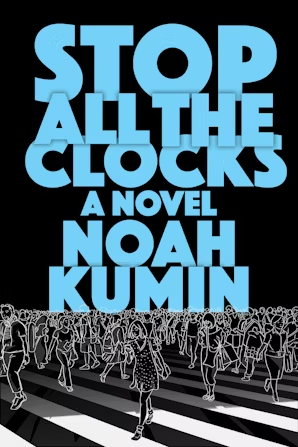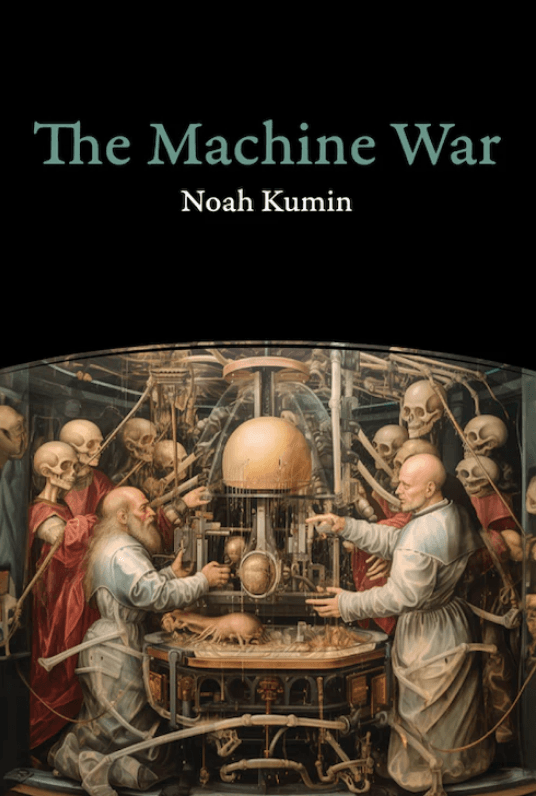This month’s Indie Book Club pick is Noah Kumin’s Stop All The Clocks, published in 2025 by Arcade, an imprint of Skyhorse Publishing. It’s best described as a philosophical thriller, and it’s a very short but entertaining read, both thought-provoking and unexpectedly funny. Noah is also the founder and editor of The Mars Review of Books and the author of The Machine War, a pamphlet on the history of computing.

Stop All The Clocks introduces us to Mona Veigh, a reclusive tech geek who has made millions by selling an AI program of her own invention to billionaire Avram Parr. The program, Hildegard, produces poetry, and is named after an obscure mystical medieval nun who invented her own language ‘to build a lonely bridge towards God.’ Hildegard is not simply an algorithmic poetry bot; it’s a sophisticated, intelligent and creative learning system, capable of learning from the poetry that Mona so loves and evolves according to rules that even she, the creator, does not fully understand. Avram Parr is obsessed with cracking the secret of eternal life, so it is somewhat ironic that he winds up dead, supposedly a suicide. Mona feels compelled to investigate, and finds herself drawn into something much bigger than she anticipated.
The book includes delightful ruminations on the nature of poetry, language, creativity and tech, and how these have moulded and shaped AI, only to be moulded and shaped by it in turn. It’s surprisingly funny in places: NYPD Detective Aldo asks Mona if she ever prays. She says she doesn’t. ‘I do,’ he says. ‘I pray to get thin. I pray and I pray and [God] doesn’t answer. That’s how I know He’s real. Only a really two-bit God would answer such a stupid prayer.’
What I really appreciated was the author’s articulation of very complex ideas. I was less enamoured by the thriller aspect: I felt that the story, interesting though it was, was simply a framework for the discussion of these ideas.
The author, Noah Kumin, has been kind enough to answer our questions.
- The title comes from WH Auden’s famous poem, Funeral Blues, which was written as a satire about a fictional character, whereas nowadays, it is regarded as an authentically heartfelt expression of grief. Isn’t this the perfect example of how meaning can change with time and context, an idea that is integral to your novel?
That’s right. The poem actually got the title “Funeral Blues” only after it had been re-printed in anthologies. Originally it was part of Auden’s verse play, The Ascent of F6, about a great-souled mountain climber destroyed by the expectations of a philistine public. In an oblique way, it inspired Stop All the Clocks.
- What led to the creation of Mona? How much of her character do you share, if any?
It’s hard to say what leads to the creation of a character. It’s an obscure process. I remember for a long time I had the idea of someone hiding out in plain sight, in one of those little towns in the greater New York City area that one passes through on the train. Mona emerged out of that idea. I grew up a three-sport athlete with plenty of friends in rural new England. I share very little with Mona other than a love of poetry.
- Your characters’ back stories are fascinating: Mona’s lonely childhood and Marcos’ father’s betrayal and his mother’s subsequent suicide. Are they completely invented?
Yes. Of course one takes small details from real life experiences. For instance I lived in Florida for nine months or so and witnessed the phenomenon, described by Marcos, of lizards spontaneously organizing themselves in a spiral pattern on a screen door. I would be curious to see if any expert in the field of animal behavior could provide and explanation for this.
- Your shadowy billionaire, Avram Parr, is obsessed with the idea of extending his life indefinitely, preferably for ever. Do you think that the pursuit of eternal life is a worthy human goal, or is it simply vain and solipsistic, even selfish?
I wouldn’t say vain and solipsistic. Perhaps selfish—but most desires are selfish. Bryan Johnson has recently brought the idea of life extension into the mainstream, although I wrote the book before I had heard of him. I can’t say I entirely understand the motivations of someone like Johnson, but it could be that enormously important scientific breakthroughs result from his quest. It’s not so uncommon for humanity to receive great gifts as a result of selfishness, or great sorrows as a result of altruism.
- A related question: do you think that ultimately, accepting your own mortality is a necessary pre-condition for a happy life?
I’m probably the wrong person to ask about the necessary pre-conditions for a happy life, I’m afraid.
- Parr despises ‘the modern notion that the greatest possible good for the world is simply the ease of human suffering,’ believing that human ambition should be bigger than that. Can you expand on this? Of course he’s a fictional character and his views are not necessarily yours … what do you think human ambition should strive for?
Right, none of the views of any of the characters in the book are mine; they’re all simply a result of imagination. Parr has simply independently derived a point of view that was not uncommon among philosophers prior to the twentieth century.
- You have said in an interview: ‘The fact that today technology moves much faster than novelists can write about it is one key reason the novel has lost its effectiveness: it has become insufficiently shamanistic.’ Do you believe the novel form has therefore lost its revolutionary power?
I’m still chewing on this. It’s obviously the case that novels play a much smaller role today in mainstream media than they did eighty or even thirty years ago. But I believe the novel is still a uniquely powerful and flexible instrument for probing life’s most important questions, and this tradition can continue even if only a small section of society continues to read serious novels. The best treatment of this question can be found in Colin Wilson’s wonderful The Craft of the Novel (a misleading title, as the book is not about craft in the sense we usually mean it).
- What can novelists do to recapture this power?
I still owe readers of the Mars Review a Part III of the “Why I Decided to Destroy Modernism/How Did Literature Get So Stuck” series, and my answer to this question will be found there.
- You have written two very thought-provoking pieces on ‘Why I Decided To Destroy Modernism – Parts I and II: https://marsreview.org/p/why-i-decided-to-destroy-modernism and https://marsreview.org/p/how-did-literature-get-so-stuck. Why not simply tell a good story well?
You know, you may be right. I’m cursed by the need to explain to myself on a rational level why I’m drawn to what I’m irrationally drawn to. But not everyone suffers from this. If another novelist simply wants to tell good stories well, and does so, I wouldn’t sneeze at that.
- What would you like readers to take away from Stop All The Clocks?
Nothing. Laura Riding said that a poem is a real poem when you can insert “not” in front of the crucial phrase in the crucial line and the poem’s meaning the same. I hope that it is similarly impossible to derive a message from Stop All the Clocks.
- Can you tell us more about The Mars Review of Books?
Today, legacy publications find themselves on a race to the bottom in order to succeed in the politicized, clickbait culture of the internet age. Meanwhile, independent writers outside that system are relegated to ephemeral media like Twitter and podcasts. The MRB sets out to bridge these two worlds—taking the best and leaving out the worst. It has since become the canonical place to find sense-making on subjects of the public interest and the most interesting place for stylish criticism on literature and art.
We’ve been lucky enough to publish seminal pieces from Tao Lin, Rick Moody, Rose Lyddon, Magdalene Taylor, and more, and to have been featured in the New Yorker, the New York Times and elsewhere. Book reviewing is not an easy business but honest reviewing is at a premium these days, and it’s a moral necessity.
- What spurred you to write The Machine War? Which readers were you aiming for?
I myself became interested in how we had arrived at the technological paradigm that currently shapes our lives. I began investigating and the results of that investigation were fascinating. I hope to reach any reader curious about that same question.

- What are you working on at the moment?
A book of nonfiction on the nature of God. It will also be published by Arcade, hopefully in 2026.